|
|
|
Sort Order |
|
|
|
Items / Page
|
|
|
|
|
|
|
| Srl | Item |
| 1 |
ID:
096042
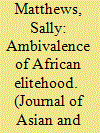

|
|
|
|
|
| Publication |
2010.
|
| Summary/Abstract |
Recent discussions in South Africa about the role of the so-called patriotic bourgeoisie highlight the much debated question of what role elite Africans can and ought to play in the upliftment of the poor. Those supporting the notion of a patriotic bourgeoisie believe that national or racial solidarity is sufficient to allow privileged Africans to act in the interests of their poorer fellow citizens. However, a reconsideration of an older discussion of African elitehood, that of Amilcar Cabral, suggests that something more may be needed before elites can act in the interests of the poor. Cabral argues that elites need to renounce their privilege and to live and struggle alongside the poor if pro-poor societal transformation is to be achieved. While Cabral may be right that shared racial or national identity is insufficient for elite solidarity with the poor, he does not consider all the complexities that arise when elites actually try to work with and for the poor. A consideration of the experiences of a long-standing Senegalese NGO reveal some of these complexities and suggest that any attempt by African elites to engage meaningfully in the upliftment of the poor, will inevitably involve continuous and difficult negotiation between paternalism and naïve egalitarianism.
|
|
|
|
|
|
|
|
|
|
|
|
|
|
|
|
| 2 |
ID:
145750
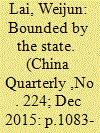

|
|
|
|
|
| Summary/Abstract |
From a regulatory perspective, philanthropy in China has been officially modernized. Since the government established a legal framework in 2004 based on models from overseas, the number of private foundations in China has grown more than six-fold. Drawing on a nationally representative survey of 214 private foundations conducted in 2012, we present a landscape view of these new philanthropic institutions, discussing both who begins foundations and how their monies are used. We find that despite the rise of new private wealth in China and the adoption of the private foundation form, government priorities are structuring the field of Chinese philanthropy in key and consequential ways. We conclude with some considerations of the implications of these findings for the development of broader civil society.
|
|
|
|
|
|
|
|
|
|
|
|
|
|
|
|
| 3 |
ID:
104038
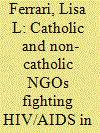

|
|
|
|
|
| Publication |
2011.
|
| Summary/Abstract |
While governments in sub-Saharan Africa work to provide in-country relief for the HIV/AIDS crisis, much health care and infrastructure comes from local or international non-governmental organizations (NGOs). The literature on NGOs suggests that collaboration increases their efficacy. Many non-Catholic NGOs do not work collaboratively with Catholic NGOs on HIV/AIDS, though the Catholic Church has rich and varied resources at its disposal for relief work. Observers often characterize the incompatibility of Catholic and non-Catholic NGOs as tactical, especially with regard to condom use. However, divergent issue framing is a critical and more fundamental distinction between the two groups. Contrasting the Catholic Church's unique spiritual frame with the scientific frame of many non-Catholic NGOs highlights the epistemological and teleological differences between the two. Reconciling these differing approaches, or finding ways to cooperate despite them, is a key element of promoting broader NGO collaboration on HIV/AIDS relief work. This theoretical analysis suggests directions for future empirical research.
|
|
|
|
|
|
|
|
|
|
|
|
|
|
|
|
| 4 |
ID:
160501
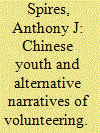

|
|
|
|
|
| Summary/Abstract |
Over the past 20 years, volunteering has developed as a new field for governmental control and regulation of an emergent civil society. This article draws on interviews with 60 young volunteers in southern China, mostly university students and recent graduates. I contrast their experiences in off-campus, youth-led voluntary associations with the officially approved student organizations of normal university life. I argue that the instrumental organization of volunteers characterizes the party-state’s efforts to funnel youthful enthusiasm and compassion into particular political projects and officially prescribed goals. Unhappy with the ‘formalistic’ nature of these activities, youth engaging in bottom–up volunteer initiatives articulate other priorities, including a strong desire for meaningful, personal engagement that state-led programmes and university student organizations are typically unable to provide.
|
|
|
|
|
|
|
|
|
|
|
|
|
|
|
|
| 5 |
ID:
126448
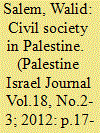

|
|
|
|
|
| Publication |
2012.
|
| Summary/Abstract |
It was as a precursor to the establishment of the Palestinian Authority (PA) in May 1994, when the prospect of state-building entered the political horizon, that the concept of "civil society" became part of the research discourse in Palestine. Questions were posed about economic issues, the proposed structure of the national authority and the feasibility of building a democratic state out of an occupied land. Many feared that the new authority would lean toward authoritarianism rather than democracy - and therefore hoped to find in civil society both a balance for the power of the state and a means of redistributing power. They hoped that civil society would indeed turn out to be, in the words of Palestinian academic George Giacaman, "that societal sphere, in which the individual plays the role of a social actor through the society organizations and in relative separation from the state" (Giacaman, 1995, p.108). This article will consider what it means to discuss Palestinian civil society, trace its historical development, and review the challenges it has faced since 2007 after the political division of the West Bank and Gaza.
|
|
|
|
|
|
|
|
|
|
|
|
|
|
|
|
| 6 |
ID:
020929
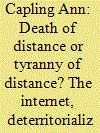

|
|
|
|
|
| Publication |
2001.
|
| Description |
443-466
|
|
|
|
|
|
|
|
|
|
|
|
|
|
|
|
| 7 |
ID:
061041


|
|
|
|
|
| Publication |
London, Routledge, 2005.
|
| Description |
xiv, 272p.
|
| Series |
Routledge/ECPR studies in European political science
|
| Standard Number |
041532548X
|
|
|
|
|
|
|
|
|
|
|
|
Copies: C:1/I:0,R:0,Q:0
Circulation
| Accession# | Call# | Current Location | Status | Policy | Location |
| 049516 | 321.8/ROB 049516 | Main | On Shelf | General | |
|
|
|
|
| 8 |
ID:
065417


|
|
|
|
|
| Publication |
London, Routledge, 2005.
|
| Description |
xv, 272p.
|
| Series |
Routledge/ECPR studies in European political science
|
| Standard Number |
041532548X
|
|
|
|
|
|
|
|
|
|
|
|
Copies: C:1/I:0,R:0,Q:0
Circulation
| Accession# | Call# | Current Location | Status | Policy | Location |
| 050085 | 321.8/ROB 050085 | Main | On Shelf | General | |
|
|
|
|
| 9 |
ID:
152100
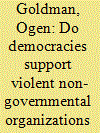

|
|
|
|
|
| Summary/Abstract |
This study draws attention to the question: Do democracies fight indirectly through material support to violent non-governmental organizations (VNGOs) which wage intrastate war against other states in general and against democracies in particular, or are democracies less warlike by proxy? The main conclusions are: democracies are less warlike by proxy than non-democratic states, and the more democratic the regime the lower the probability that it will support VNGOs waging war against other states, both in general and against other democracies in particular. The results do not unequivocally support both the monadic or dyadic argument of democratic peaceful behaviour
|
|
|
|
|
|
|
|
|
|
|
|
|
|
|
|
| 10 |
ID:
059989
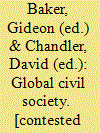

|
|
|
|
|
| Publication |
Abingdon, Routledge, 2005.
|
| Description |
xi, 205p.
|
| Series |
Routledge advances in international relations and global politics; no. 32
|
| Standard Number |
0415354803
|
|
|
|
|
|
|
|
|
|
|
|
Copies: C:1/I:0,R:0,Q:0
Circulation
| Accession# | Call# | Current Location | Status | Policy | Location |
| 049334 | 300/BAK 049334 | Main | On Shelf | General | |
|
|
|
|
| 11 |
ID:
051143


|
|
|
|
|
| Publication |
Westport, Praeger Publishers, 2003.
|
| Description |
206p.
|
| Standard Number |
0275973883
|
|
|
|
|
|
|
|
|
|
|
|
Copies: C:1/I:0,R:0,Q:0
Circulation
| Accession# | Call# | Current Location | Status | Policy | Location |
| 046786 | 327.1/SUT 046786 | Main | On Shelf | General | |
|
|
|
|
| 12 |
ID:
149432


|
|
|
|
|
| Summary/Abstract |
This paper aims to contribute to the growing Foreign Policy Analysis literature by focusing on the role of non-state actors in foreign policy implementation. Special attention is paid to the case of Turkey, which has emerged as a ‘humanitarian state’ in the last decade. In Turkey, relatively new Islamically oriented humanitarian NGOs (HNGOs) have been providing ever-increasing amounts of humanitarian aid throughout the former Ottoman lands including the Middle East and Africa. Employing a constructivist-realist perspective, this paper asserts that a ‘parallelism,’ if not a complementarity, exists between Turkey’s Islamically oriented HNGO discourse and practice and AKP foreign policy implementation process. Based on primary qualitative data acquired from interviews, this study has identified various degrees of parallelism between the two, calling into question the status of these HNGOs as purportedly non-governmental entities.
|
|
|
|
|
|
|
|
|
|
|
|
|
|
|
|
| 13 |
ID:
134373
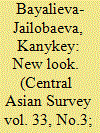

|
|
|
|
|
| Summary/Abstract |
Non-governmental organizations (NGOs) in post-Soviet Kyrgyzstan have become visible players in the social and political scene. However, despite being portrayed as professional organizations in the literature, the professionalization of NGOs in Kyrgyzstan has been understudied. This article aims to rectify this gap. It presents and discusses the findings of a study analysing NGOs from an organizational perspective using semi-structured interviews with 45 NGOs, self-administered questionnaires with their leaders and employees, and observation of their working environment. The key conclusion is that the NGO sector can be described as semi-professional. NGOs use different tactics to achieve efficiency and effectiveness. However, they face such challenges as limited funding, high staff turnover and poor coordination. The article provides an account of the NGO sector by mapping it into professional and non-professional groups that can serve as a new benchmark for better understanding NGOs in Kyrgyzstan.
|
|
|
|
|
|
|
|
|
|
|
|
|
|
|
|
| 14 |
ID:
077413


|
|
|
|
|
| Publication |
2007.
|
| Summary/Abstract |
Social and economic policy decisions are increasingly being taken in a global public domain in which national/transnational boundaries are blurred, and the `public' domain includes non-state actors. We argue that a new rights advocacy, advancing economic and social human rights as well as civil and political, is essential to understanding rule-making in the global public domain. New rights advocacy involves traditional human rights and development NGOs, social movement organizations and new `hybrid' organizations, in using human rights standards and methods to influence states, international organizations, and corporations. The new patterns of NGO engagement are studied through case studies of advocacy on HIV/AIDS and on the right to water. New rights advocacy constitutes a direct challenge to development orthodoxy, suggests a new interpretation of the social movements protesting globalization, and manifests a complex relationship between NGOs and poor country governments, in which NGOs often advocate on behalf of these governments' sovereign rights to set economic and social policy.
|
|
|
|
|
|
|
|
|
|
|
|
|
|
|
|
| 15 |
ID:
055257


|
|
|
| 16 |
ID:
023160


|
|
|
|
|
| Publication |
Fall 2002.
|
| Description |
72-95
|
|
|
|
|
|
|
|
|
|
|
|
|
|
|
|
| 17 |
ID:
058155


|
|
|
|
|
| Edition |
2nd ed.
|
| Publication |
New Delhi, Viva Books, 2005.
|
| Description |
vii, 515p.
|
| Standard Number |
8176498696
|
|
|
|
|
|
|
|
|
|
|
|
Copies: C:1/I:0,R:0,Q:0
Circulation
| Accession# | Call# | Current Location | Status | Policy | Location |
| 049014 | 341.2/DIE 049014 | Main | On Shelf | General | |
|
|
|
|
| 18 |
ID:
052261
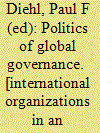

|
|
|
|
|
| Publication |
London, Lynne Rienner, 2001.
|
| Description |
vii, 515p.
|
| Standard Number |
1555879144
|
|
|
|
|
|
|
|
|
|
|
|
Copies: C:1/I:0,R:0,Q:0
Circulation
| Accession# | Call# | Current Location | Status | Policy | Location |
| 046405 | 341.2/DIE 046405 | Main | On Shelf | General | |
|
|
|
|
| 19 |
ID:
171023
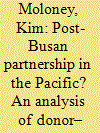

|
|
|
|
|
| Summary/Abstract |
This paper explores the possibility of a partnership between foreign aid donors and South Pacific NGOs. This partnership focus emerged out of the 2011 Busan Outcome Document. Drawing on 51 interviews of donors and Pacific-created NGOs in four countries (Fiji, Samoa, Solomon Islands, and Vanuatu), this paper finds limited donor–NGO partnership. Reasons include insufficient donor interest in a partnership, capacity and accountability concerns for Pacific NGOs, and scarce core funding. While global agreements to encourage partnership are important components of development effectiveness discussions, donor–NGO partnership is not yet possible within the Pacific context.
|
|
|
|
|
|
|
|
|
|
|
|
|
|
|
|
| 20 |
ID:
163099
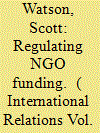

|
|
|
|
|
| Summary/Abstract |
Securitization theory (ST) has succeeded in putting the relation between politics and security at the forefront of research in security studies. Despite this success, little attention has been given to the way states themselves produce the boundaries of legitimate political activity, particularly in relation to the boundaries between civil society and the state and between the foreign and domestic. This article is concerned with how states see the boundary between the political and the non-political as a matter of security. It investigates this question by examining the international and national efforts to restrict the financing of non-governmental organizations (NGOs) and civil society actors. It demonstrates that these entities are deemed threatening to the established boundaries of legitimate political activity and thus subject to harassment, increased regulation, and eradication. This is done by the depiction of their activities as political, rather than humanitarian/cultural/social, demonstrating that the concepts of politics operative in the ST literature are already delimited through processes of securitization and depoliticization. Continued research into the relation between politics and security must therefore consider the ways that the political itself is securitized.
|
|
|
|
|
|
|
|
|
|
|
|
|
|
|
|
|
|
|
|
|